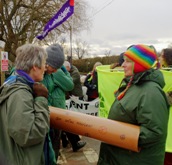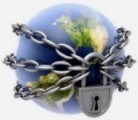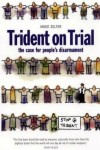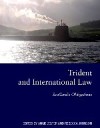Summary of Trident Crimes
The threat or use of the nuclear warheads on the UK Trident weapon system that is currently deployed, is criminal under international law. The UK’s reliance on Trident in its military posture amounts to a criminal conspiracy to carry out war crimes and crimes against peace in contravention of international humanitarian law.
International Law and Nuclear Weapons in General
The July 8th 1996 Advisory Opinion of the International Court of Justice (ICJ) outlines the sources of international law as they relate to nuclear weapons, and makes it quite clear that nuclear weapons would generally breach all of the following laws and customs of war:
-
The Declaration of St. Petersburg, 1868 because unnecessary suffering would be caused;
-
The Martens Clause, 1899 because humanity would not remain under the protection and authority of the principles of international law derived from established custom, from the principles of humanity and from the dictates of public conscience;
-
The Hague Conventions, 1907 because unnecessary suffering would be caused and there would be no guarantee of the inviolability of neutral nations;
-
The U.N. Charter, 1945 because such a use of force would not be proportionate;
-
The Universal Declaration of Human Rights, 1948 because longlasting radioactive contamination would interfere with innocent people’s inherent right to life and health;
-
The Geneva Conventions, 1949 (which has been brought directly into UK law through the 1957 Geneva Conventions Act) because protection of the wounded, sick, the infirm, expectant mothers, civilian hospitals and health workers would not be ensured;
-
The Protocols Additional to the Geneva Conventions, 1977 (which have also been directly brought into UK law through the 1995 Geneva Conventions (Amendments) Act) because there would be massive incidental losses of civilian lives and widespread, long term and severe damage to the environment if a nuclear weapon were to be used.
Serious violations of these treaties and declarations are defined as criminal acts under the Principles of International Law Recognized in the Charter of the Nuremberg Tribunal and ins the Judgement of the Tribunal and were adopted by the International Law Commission of the United Nations, 1950. Principle VI defines crimes against peace, war crimes and crimes against humanity.
Specifically, Nuremberg Principle VI (a) defines Crimes against Peace as “Planning, preparation,
initiation or waging of … a war in violation of international treaties, agreements or assurances …
Participation in a common plan or conspiracy for the accomplishment of any of the acts mentioned”.
Nuremberg Principle VI (b) defines War Crimes as “violations of the laws or customs of war” .
Nuremberg Principle VI (c) defines Crimes against Humanity as “murder, extermination … and other inhumane acts done against any civilian population … when … carried on in execution of, or in connection with any crime against peace or any war crime”. In addition The NonProliferation
Treaty (NPT), 1968 is being violated now, in that the United Kingdom is not fulfilling its obligation to negotiate in good faith for nuclear disarmament but instead, is seeking to replace Trident with an updated new nuclear weapon system.
Illegality of the United Kingdom’s Nuclear Weapons
British Trident nuclear warheads are 100 to 120 kilotons each – that is around 8 to 10 times larger than the ones used at Hiroshima and Nagasaki (the bombing of these 2 cities have been judged to be war crimes). Trident nuclear warhead targets are known to include numerous city targets. Such use of these particular nuclear weapons could not distinguish between civilian and military targets, nor are they intended to do so. Indeed it is a nonsense to suggest that a nuclear bomb 8 times larger than the Hiroshima bomb could possibly do so. The reason nuclear weapons are targeted in this way is to try to deter war by threatening mass destruction the purpose of Trident is to terrorise and to create “incalculable and unacceptable” risks, just as the NATO Strategic Concept Document specifies.
H.E. Ju dge Bedjaoui, who was President of the International Court of Justice1994-1997
which included the period of the historic Advisory Opinion of 1996, made a clear statement on the illegality of UK nuclear weapons (see pages 9091 of ‘Trident and International Law – Scotland’s Obligations’, edited by Rebecca Johnson and Angie Zelter by Luath Press Ltd in 2007):
“I would like to stress that the International Court of Justice in its Advisory Opinion of July 8, 1996, did not have at its disposal adequate elements of fact to permit concluding with certainty whether a specific nuclear weapon system would be contrary to the principles and rules of the law applicable in armed conflict. The Court was asked to rule on a general question of use and threat of use of nuclear weapons. If the Court had been asked to rule on the legality of a specific nuclear weapons system or doctrine the conclusion we arrived at might well have been much clearer.
I have been asked to give a personal opinion on the legality of a nuclear weapons system that deploys over 100 nuclear warheads with an approximate yield of 100 kt per warhead. Bearing in mind that warheads of this size constitute around eight times the explosive power of the bomb that flattened Hiroshima in 1945 and killed over 100,000 civilians, it follows that the use of even a single such warhead in any circumstance, whether a first or second use and whether intended to be targeted against civilian populations or military objectives, would inevitably violate the prohibitions on the infliction of unnecessary suffering and indiscriminate harm as well as the rule of proportionality including with respect to the environment. In my opinion, such a system deployed and ready for action would be unlawful. In accordance with evidence heard by the Court, it is clear that an explosion caused by the detonation of just one 100 kt warhead would release powerful and prolonged ionising radiation, which could not be contained in space or time, and which would harmfully affect civilians as well as combatants, neutral as well as belligerent states states, and future generations as well as people targeted in the present time. In view of these extraordinarily powerful characteristics and effects, any use of such a warhead would contravene international and humanitarian laws and precepts. In other words, even in an extreme circumstance of self-defence, in which the very survival of a State would be at stake, the use of a 100 kt nuclear warhead – regardless of whether it was targeted to land accurately on or above a military target would always fail the tests of controllability, discrimination, civilian immunity, and neutral rights and would thus be unlawful.
In my opinion, any state that aids and abets another country, in the deployment and maintenance of nuclear warheads of 100 kt or comparable explosive power would also be acting unlawfully.
The modernisation, updating or renewal of such a nuclear weapon system would also be a material breach of NPT obligations, particularly the unequivocal undertaking by the nuclear weapon states to “accomplish the total elimination of their nuclear arsenals leading to nuclear disarmament” and the fundamental Article VI obligation to negotiate in good faith on cessation of the arms race and on nuclear disarmament, with the understanding that these negotiations must be pursued in good faith and brought to conclusion in a timely manner.”
For further reading on the laws of armed conflict, national law and the law of nations see http://inlapwcp.webplus.net/Laws%20of%20War.pdf
You may get ideas about how to express the crimes if you read the way Judge C.G. Weeramantry, also a Judge at the ICJ Advisory Opinion Hearings in 1996, expresses it below. (Pages 2123 of ‘Trident and International Law – Scotland’s Obligations’, edited by Rebecca Johnson and Angie Zelter by Luath Press Ltd in 2007).
You could choose any number of his statements below:
- The use of nuclear weapons is illegal in any circumstances whatsoever.
-
The threat of use of nuclear weapons is illegal in any circumstances whatever.
-
The possession of nuclear weapons is illegal, for possession is not for showcase display but for use if required.
-
The further development of nuclear weapons is illegal.
-
The manufacture and testing of nuclear weapons are illegal.
-
The use of nuclear weapons violates every rule of humanitarian law.
-
The use of nuclear weapons violates every principle of human rights, to which all nations are committed.
-
The use of nuclear weapons is a crime against humanity.
-
Nuclear weapons are a weapon of genocide.
-
There is an obligation on all nuclear states to take meaningful steps to reduce and eliminate their stocks.
-
Failure to reduce stocks with a view to their total elimination is a violation of the requirements laid down by the unanimous opinion of the International Court of Justice.
-
The testing and improvement of existing nuclear weapons is a contravention of the obligations of nuclear states under international law and of the unanimous opinion of the International Court of Justice.
-
Every citizen has an obligation to use his or her influence to prevent crimes against humanity.
-
There is an absolute contravention of international law if belligerent states cause irretrievable damage to neighbouring states.
-
It is an absolute contravention of international law to cause irretrievable damage to the environment.
-
It is an absolute contravention of international law to cause irretrievable damage to future generations.
-
Devastation of the enemy’s countryside and the mass slaughter of its population go far beyond the purposes of war and are international crimes.
-
There cannot be self appointed enforcers of the rule against nuclear weapons, especially if the self-appointed enforcers are themselves principal violators of this rule.
-
There cannot be one law for some members of the international community of nations and another law for others.
-
Those who take the decision to launch a nuclear weapon are personally guilty of a crime against humanity.
He backed up his legal formulations above with factual statements as below:
-
Nuclear weapons constitute a threat to the health of the community.
-
Nuclear weapons cause indiscriminate slaughter of the enemy population.
-
Nuclear weapons are a source of environmental pollution for thousands of years
-
Nuclear weapons cause excruciating suffering which goes far beyond the needs of war.
-
Nuclear weapons are a health hazard for an unforeseeable number of generations.
-
Nuclear weapons produce social disintegration.
-
Nuclear weapons contaminate and destroy the food chain.
-
Nuclear weapons cause genetic defects and deformities transmissible in perpetuity to future generations.
-
Nuclear weapons produce lasting psychological stress and fear syndromes.
-
Nuclear weapons wreak cultural devastation, irretrievably destroying historical monuments, historical documents and works of art, which are the inheritance of centuries.”
Humanitarian Impacts, Human Rights Law and Nuclear Weapons
For information on the humanitarian impacts of nuclear weapons it would be a good idea to look at a short summary that you can read at http://www.icanw.org/wpcontent/uploads/2012/08/catastrophicharm2012.pdf
The International Covenant on Civil and Political Rights (ICCPR), also sheds light on some of the
crimes under human rights law. See http://lcnp.org/wcourt/GenevaBENNOUNE.4ca.pdf for more details and especially for the interpretation of its content described in the following words:“[i]t is evident that the designing, testing, manufacture, possession and deployment of nuclear weapons are among the greatest threats to the right to life which confront mankind today. This threat is compounded by the danger that the actual use of such weapons may be brought about, not only in the event of war, but even through human or mechanical error or failure… Furthermore, the very existence and gravity of this threat generates a climate of suspicion and fear between States, which is in itself antagonistic to the promotion of universal respect for and observance of human rights and fundamental freedoms in accordance with the Charter of the United Nations and the International Covenants on Human Rights… ”
The broader human rights consequences of nations spending their peoples’ resources to produce such weapons are especially pronounced in the area of economic, social and cultural rights. The interconnection between these rights and the stockpiling of expensive weaponry, like nuclear weapons, was understood as long ago as 1953, when former General and U.S. President Dwight Eisenhower said:“(e)very gun that is made, every warship launched, every rocket fired, (is) in the final sense, a theft from those who are hungry and not fed, those who are cold and not clothed. This world is not spending money alone. It is spending the sweat of its laborers, the genius of its scientists and the hopes of its children.”
It is a crime to threaten mass murder.
It is a crime to prepare for mass murder.
Trident is the crime.












 Nuclear weapons crime in the UK has been reported to Thames Valley Police.
Nuclear weapons crime in the UK has been reported to Thames Valley Police.









